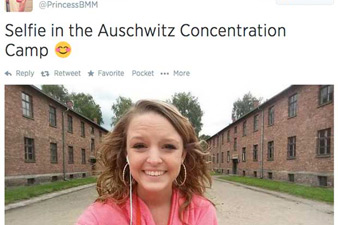
22/07/2014 17:52
The other side of the infamous “Auschwitz selfie”
On June 20, a newly minted high school graduate from eastern Alabama walked into the Auschwitz-Birkenau concentration camp, paused in front of a barracks … and took a picture of herself.
The despicable nature of all of this is self-evident, right? Smiling teen with one earbud in. Blushing emoji, as if she realizes she should be ashamed — but isn’t. And then there are her follow-up tweets, dozens and dozens of threats and defenses and angry replies, all of them simmering down to one blood-boiling theme: Sorry, but I’m not sorry.
No wonder she has, in the past 24 hours, gotten more than 6,000 hateful tweets directed at her.
And yet, the funny thing about viral images is how endlessly easy it is to misunderstand them. The selfie is already a politically and socially fraught form of expression, as many sociologists and social media theorists have written before; while self-portraits are understood by many to be little more than a flagrant show of narcissism or a plea for attention, they may mean something different to the taker herself. It’s less a matter of self-glorification than self-documentation — “I was here.” “This is who I was that day.” “This happened.”
“Self captured images allow young adults and teens to express their mood states and share important experiences,” the clinical psychologist Andrea Letamendi told Time last September. In other words — to paraphrase Jennifer Outllette, who recently published a book on “the science of self” — selfies aren’t merely a “look-at-me!” attention-grab. They’re an attempt to place oneself in a context, to understand how we fit into a bigger picture.
But in the case of the so-called Auschwitz selfie, the issues aren’t merely theoretical. The young woman, Breanna — whose last name we aren’t using, out of respect for her Google results — has said that her father died on June 20, 2013, exactly a year before her selfie was taken. (An obituary from the local paper confirms.) Per a string of tweets by Breanna (who has recently made her Twitter account private) and her mother, the two had spent a lot of time studying history together, and the Holocaust was the last thing they covered before his death. Breanna had, according to her mother, even met with and spoken to a Holocaust survivor.
So when Breanna found herself at a Holocaust landmark on the last day of her European tour — and the first anniversary of her father’s death — she took a picture. This could very well be one of those instance of self-documentation — I was here; this is who I was that day; this happened.
That doesn’t make it “okay,” to borrow an un-nuanced, Web-ready phrase. In truth, it’s hard to think of anything less sensitive, less appropriate or less self-aware than a “selfie in the Auschwitz Concentration Camp” — smiley — as if the suffering of millions of people was somehow subsumed by Breanna’s own personal narrative. She was there, sure, but so were tens of thousands of others, and her willful minimization of that fact is, frankly, pretty gross.
And yet there’s plenty of grossness to go around, it would seem. Within the past three hours as of this writing, six users have posted selfies or glamour shots to Instagram with the hashtag #auschwitz. Just six days before Breanna posted her own selfie, the New Yorker documented the phenomenon in an article titled “Should Auschwitz be a Site for Selfies?” And yet this specific image — already a month old, and buried deep in Breanna’s Twitter feed — is the only one that “went viral,” because it’s the only one Business Insider (and Buzzfeed and Gawker and the Daily Mail and all the other usual mainstays of the Internet outrage machine) chose to boost. There are pageviews to be had, and money to be made, in shaming dumb kids with Twitter accounts … regardless of how dated and unexceptional the tweet, or how complicating their back stories.
Maybe it would have been more productive to discuss the fact that many, many people take selfies in self-evidently inappropriate places, and why they do that, and what it means. Maybe it would have been more accurate to point out that this isn’t an isolated incident, but a greater sociological phenomenon — and one that deserves real consideration. Maybe, just maybe, it would have been more rational to realize there are other responses to things we don’t like online besides dumb outrage, and that even the Internet’s most obvious villains might have reasons for their mistakes.
But consideration and nuance aren’t clicky — and Internet outrage has no place for humanizing details. As Breanna’s mother and boyfriend and friends have tweeted, defiantly, to her Twitter haters — refusing to give into the outrage and apologize — even the most self-evidently despicable actions can have alternative explanations. Maybe an Auschwitz selfie can also be a sincere — if misguided — kind of tribute.
“If people don’t understand it’s ‘look Dad, I made it’ vs ‘Haha concentration camp!’, they don’t understand love, loss & memories,” one woman tweeted.
Maybe that indictment goes both ways.
Newsfeed
Recent news of this section
12/12/2024 17:38








